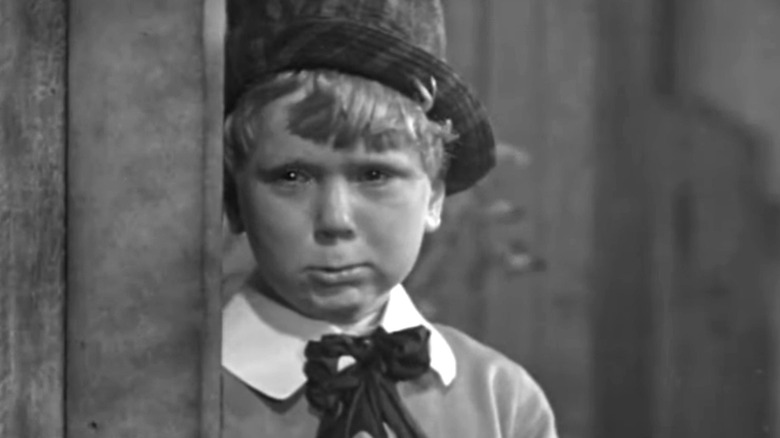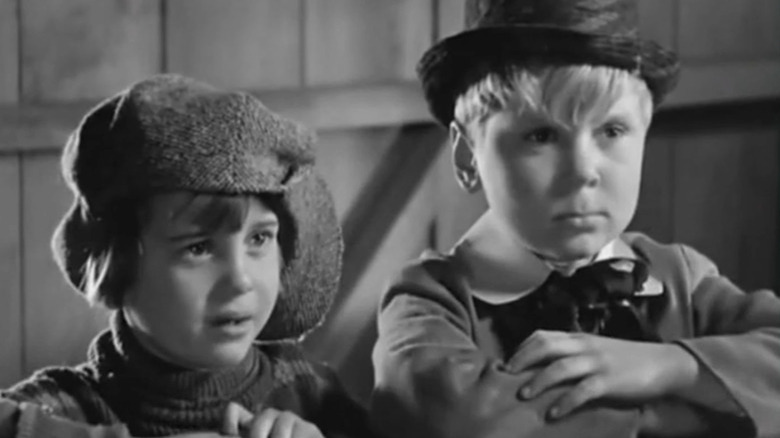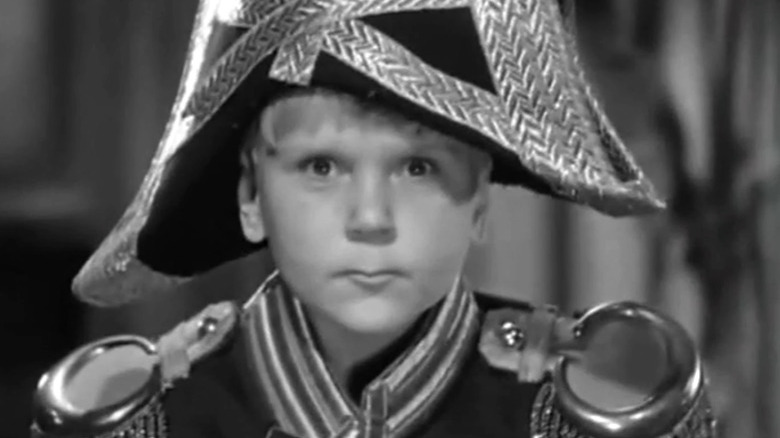The First Best Picture Oscar Nominee Based On A Comic Was In 1931
Superhero movies based on comics are currently the most successful and lucrative genre on the planet, and they have been for many years. But that's not enough for some people. For some reason, some of us have got it into our heads that films based on comics about Spider-Man and Batman also require Academy Award recognition — as though they haven't already won the ultimate popularity contest already, and they need to win this other, smaller popularity contest held exclusively by bourgeois Hollywood in order to be legitimized.
There was a bit of outrage when Christopher Nolan's "The Dark Knight" was snubbed along with the immensely popular and populist Pixar sci-fi comedy "WALL-E," and the two movies' exclusion from the Best Picture race directly preceded the expansion of the category from five films to ten. But even though people thought the expanded Best Picture field might allow for more popular films to get nominated along with the art house fare that usually does, it hasn't cleared the field as much as you might have thought. The first superhero movie based on a comic to get a Best Picture nomination was "Black Panther," ten years later, followed the next year by "Joker."
And while fans of DC and Marvel movies celebrated when they saw their beloved franchises finally represented in the upper echelons of the Oscars, many of them missed the fact that neither of those films was the first movie based on a comic to be nominated for Best Picture. The first one was way back at the fourth Academy Awards.
Skippy, aka the giant multimedia franchise you probably never knew about
The comic "Skippy" was created by Percy Crosby back in 1923 and ran until 1945. It's the story of a troublemaking young boy named Skippy Skinner, who had a series of adventures involving childhood mischief and coming-of-age foibles. The comic may be somewhat forgotten today, but for years it was a massively successful franchise that spawned ancillary merchandise, at least some of which you probably haven't forgotten.
The popular peanut butter brand, "Skippy," is still on the shelves and took its name from Percy Crosby's comic but, rather pointedly, without his permission. He tried to make them stop, but the makers of the hydrogenated peanut whip eventually secured the rights to the name while Crosby was spending his waning years in a mental hospital. The next time you make yourself a PB&J, spare a thought for some poor comics creators, whose rights to their art are all too often sacrificed at one corporate altar or another.
Anyway, "Skippy" was such a pop culture juggernaut that in 1931, Paramount Pictures produced a feature film version starring Jackie Cooper, a young actor whose long career would eventually find him playing Perry White, the editor of the Daily Planet in the Christopher Reeve "Superman" movies. Directed by Norman Taurog and co-written by Joseph L. Mankiewicz — who later won multiple Academy Awards himself for writing and directing "All About Eve" and "Letter to Three Wives" — the film finds Skippy pulling out every trick he can think of to rescue his best friend's dog from the pound before a sadistic dog catcher can put it down.
Skippy made Oscar history, and lots of it
"Skippy" is, as of this writing, difficult to find on home video, as is its sequel, "Sooky," about Skippy's lovable sidekick. But if you can track "Skippy" down, you may discover that it's a remarkably strong film.
Anchored by an impeccable performance from Jackie Cooper, it's genuinely funny but isn't afraid to go to some very serious, unpleasant places as its characters come of age. Between "Skippy" and "The Champ," also released in 1931 (and also nominated for Best Picture), Cooper delivered some of the most impressive acting any young performer has ever delivered on camera. They're a must-see double feature (again, if you can find "Skippy").
The Academy was also impressed. "Skippy" was nominated for four Oscars: Best Writing (Adaptation), Best Actor, Best Director, and Best Picture. At nine years old, Cooper was and still is the youngest performer ever nominated for Best Actor. Norman Taurog won Best Director, and at only 32 years old, he became the youngest Best Director winner in Academy Awards history, a title he held for the better part of a century until Damien Chazelle won for "La La Land." (Chazelle was also 32 years old, but was technically slightly younger than Taurog, by 221 days.)
Cooper lost the Best Actor Oscar to Lionel Barrymore for his performance in the crime drama, "A Free Soul," and "Skippy" lost the Oscars for Best Writing (Adaptation) and Best Picture to the western, "Cimarron." Looking back, the technically ambitious but comparatively stuffy and judgmental "Cimarron" has aged rather poorly compared to "Skippy," a film whose emphasis on character, whimsy, and well-earned melodrama make it absorbing to this day.
So the next time you're in one of those petty squabbles about who would win in a fight, never forget that a little boy named Skippy beat both Black Panther and Joker — by about 87 years.


